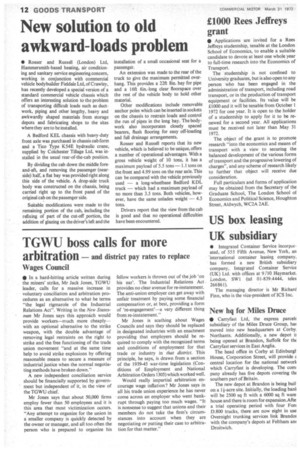TGWU boss calls for more
Page 14

If you've noticed an error in this article please click here to report it so we can fix it.
arbitration — and district pay rates to replace
Wages Council
• In a hard-hitting article written during the miners' strike, Mr Jack Jones, TGWU leader, calls for a massive increase in voluntary conciliation and arbitration procedures as an alternative to what he terms "the legal rigmarole of the Industrial Relations Act". Writing in the New Statesman Mr Jones says this approach would provide workers—much more cheaply— with an optional alternative to the strike weapon, with the double advantage of removing legal restraints on the right to strike and the free functioning of the trade union movement "and at the same time help to avoid strike explosions by offering reasonable means to secure a measure of industrial justice when the normal negotiating methods have broken down."
A new independent conciliation service should be financially supported by government but independent of it, in the view of the TGWU chief.
Mr Jones says that about 50,000 firms employ fewer than 50 employees and it is this area that most victimization occurs. "Any attempt to organize for the union in a smaller company is quickly detected by the owner or manager, and all too often the person who is prepared to organize his fellow workers is thrown out of the job 'on his ear'. The Industrial Relations Act provides no clear avenue for re-instatement. The anti-union employer can get away with unfair treatment by paying some financial compensation or, at best, providing a form of 're-engagement'—a very different thing from re-instatement."
Mr Jones is scathing about Wages Councils and says they should be replaced in designated industries with an enactment providing that employers should be required to comply with the recognized terms and conditions of employment for that trade or industry in that district. This principle, he says, is drawn from a section of the 1939-45 war-time legislation (Conditions of Employment and National Arbitration Orders 1305) which worked well.
Would really impartial arbitration encourage wage inflation? Mr Jones says in all his trade union experience he has never come across an employer who went bankrupt through paying too much wages. "It is nonsense to suggest that unions and their members do not take the firm's circumstances into account when they are negotiating or putting their case to arbitration for that matter."




















































































